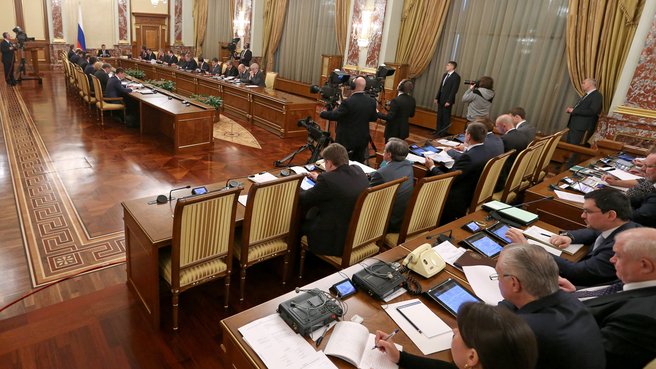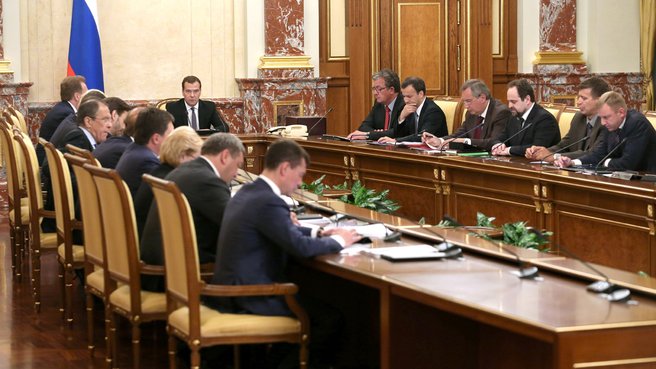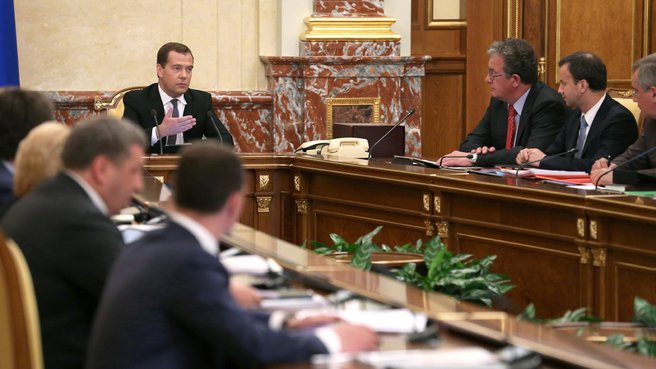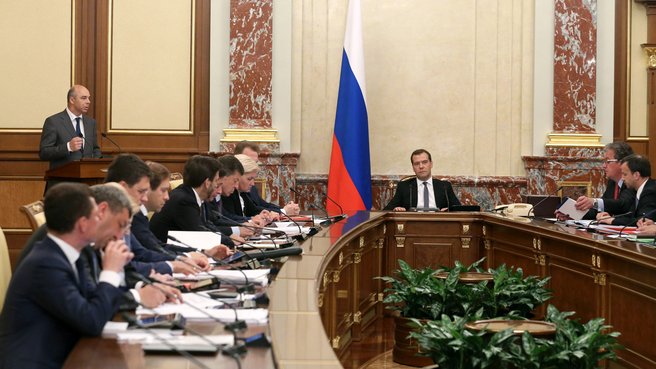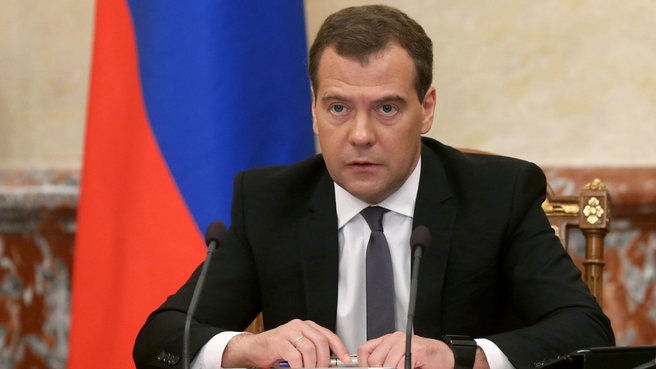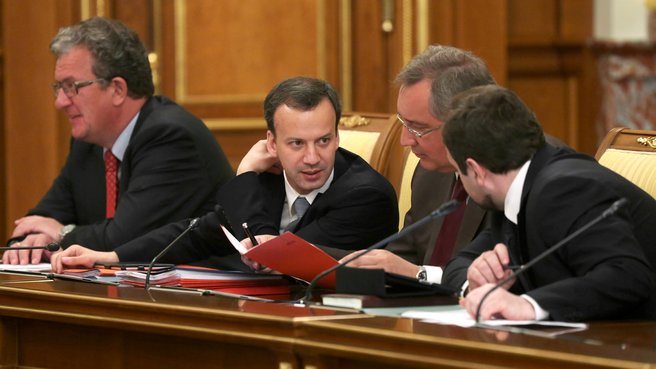Agenda: Federal budget performance, progress of federal targeted programmes and the Federal Targeted Investment Programme for 2012, ten other issues.
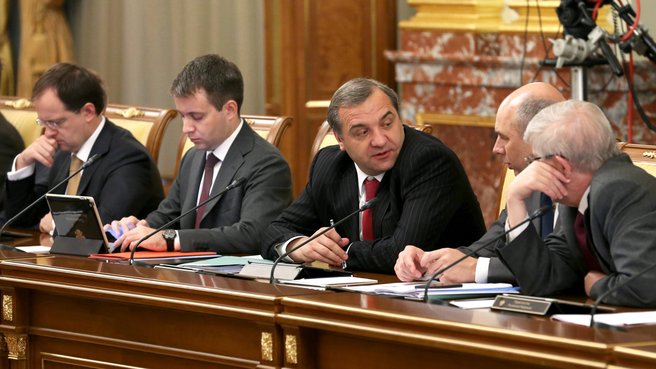
Minister of Culture Vladimir Medinsky, Minister of Communications and Mass Media Nikolai Nikiforov, Minister of Civil Defence, Emergencies and Disaster Relief Vladimir Puchkov, Finance Minister Anton Siluanov and Central Bank chairman Sergei Ignatyev
Government meeting
Transcript:
Dmitry Medvedev: Good afternoon, colleagues. Before we start working I would like to wish Sergei Prikhodko success in his new and very difficult job as Deputy Prime Minister and Head of the Government’s Executive Office. You all know Mr Prikhodko in his former capacity, including his work in the Government’s Executive Office, so I look forward to fruitful cooperation. Mr Prikhodko, I wish you success.
Sergei Prikhodko: Thank you.
Dmitry Medvedev: Let’s discuss the 2012 federal budget performance. I’d like to remind you that in accordance with the Budget Code, the Government must submit its budget performance report to the Audit Chamber by June 1 at the latest. A draft federal law on the performance of the 2012 federal budget is to be forwarded to the State Duma by August 1.
Government meeting
Here are some figures pertaining to budget performance last year. Gross domestic product increased by 3.4% compared with 2011 and amounted to nearly 62.6 trillion roubles. Revenue equalled 12.85 trillion and expenditures nearly 12.9 trillion roubles. The budget deficit is very small, at approximately 0.1% of the GDP.
I’d like to remind you of some figures so that everyone has a clear picture of the situation: in 2008 we had a surplus of 4%; in 2009 a shortage of 6%; in 2010 a shortage of 4% and in 2011 a very small surplus of 0.8% of the GDP. These are the figures.
Speaking about the structure, oil and gas revenues (50.2% of the total) have surpassed all others by a relatively small amount – 0.4%. They are nearly balanced, with a difference of about 51 billion roubles. The federal budget received the biggest part of revenues from customs duties, value added tax and a mining tax.
I think that on the whole, we did a good job this past year. We fulfilled our social commitments and guaranteed macro-economic stability, which are probably the most important goals under the circumstances.
Dmitry Medvedev: Gross domestic product increased by 3.4% compared with 2011 and amounted to nearly 62.6 trillion roubles. Revenue equalled 12.85 trillion and expenditures nearly 12.9 trillion roubles. The budget deficit is very small, at approximately 0.1% of the GDP.
A few words about the implementation of the federal investment programme and other federal targeted programmes for 2012. More than 1.5 trillion roubles were allocated from the federal budget on 52 federal targeted programmes, including the programme on investment. More than 1,000 facilities were put into operation under this programme. That's about 80% of the plan, just as in 2011. Let’s be straight about it – there is room for improvement. Of course, 80% is 80%, but we must do better than that, although we have not produced higher figures in the past few years. We’ll talk about this and hear from our experts.
The Government has received reports on the execution of the budgets of the Federal Mandatory Health Insurance Fund, the Pension Fund and the Social Insurance Fund for 2012. Their budgets were formed based on insurance premiums, tax deductions, federal budget allocations and other sources in accordance with the legislation. On the whole, the revenues of these funds continue to grow. Our task is to improve the mechanisms of their performance and expand opportunities for effective targeted social assistance to our citizens.
The Health Insurance Fund has received about one trillion roubles. This is a high figure – it is 5.5% above the planned amount. The fund spent 932 billion roubles, including 230 billion roubles on regional programmes for healthcare modernisation – to repair premises, provide modern medical equipment to hospitals and outpatient clinics, introduce information systems and professional standards, expand the network of outpatient treatment, raise salaries of medical workers, and make lump sum payments for work in rural areas. Yesterday we saw an outpatient treatment station that looked fairly good. Lump sum payments are being provided to people who work there.
Dmitry Medvedev: Speaking about the structure, oil and gas revenues (50.2% of the total) have surpassed all others by a relatively small amount – 0.4%. They are nearly balanced
About 52 billion roubles from the federal budget were spent on additional annual medical checkups for working people, orphans and children suffering hardships.
The budget of the Social Insurance Fund is more than 630 billion roubles. Its revenues exceed expenses by 100 billion roubles. This is due to the increase in payroll funds and discounted rates for some categories of policy holders. The fund spent over 530 billion roubles. It fully met its commitments on social insurance in the event of temporary disability, industrial accidents, occupational illness and maternity. In addition, the federal budget paid for allowances to radiation victims, and for purchase of technical rehabilitation devices for people with disabilities and vouchers for treatment at health resorts. The fund provided the required social protection to working people and some categories of non-workers.
The Pension Fund budget allowed us to meet all pension payment obligations. They were adjusted for inflation above its rate. The average annual retirement pension rose to almost double the subsistence level – the exact figure is 1.9 times, and reached 9,790 roubles. The fund executed its budget with a surplus of 218 billion roubles on current commitments. Its revenues exceeded expenses by 220 billion roubles in the funded component of the budget.
Dmitry Medvedev: The Pension Fund budget allowed us to meet all pension payment obligations. They were adjusted for inflation above its rate. The average annual retirement pension rose to almost double the subsistence level – the exact figure is 1.9 times, and reached 9,790 roubles.
The federal budget paid considerable sums for the valorisation of notional pension capital, payment of state pensions, premiums to pensions, allowances and compensations. In total, these intra-budget transfers amounted to 2.815 trillion roubles. They were also spent on monthly payments to people with disabilities, war veterans and heroes of the Soviet Union and the Russian Federation, maternity capital, and on co-financing of the National Wealfare Fund. I’d like to add that we will continue improving our pension system.
Today we’ll also sum up the results of the heating season and the performance of large energy companies, as well as housing and utilities. This winter was quite severe in many regions. On the whole, the energy system worked well. Its performance can be even described as reliable and stable. The general reduction in the accident rate was 3.5%. Most accidents occurred at Soviet-era facilities. Regrettably, the accident rate on heating mains has grown, particularly in the South and Far Eastern federal districts. The St Petersburg heating system is also fairly worn out. The Republic of Tyva had an emergency that required government involvement. Mr Dvorkovich (Deputy Prime Minister Arkady Dvorkovich) went there to find out what happened. A local heating station broke down leaving more than 3,000 people without heat for days when it was very cold. Social facilities had no heat, either. There were problems with heat supplies in the village of Tiksi in the Republic of Sakha (Yakutia). I hope that all federal, regional and municipal authorities will draw the right conclusions from this in planning the preparations for next autumn and winter. That said, I’ll repeat that on the whole the period under review went well.
Let’s start to discuss the first issue. I’ll give the floor to the Minister of Finance. Mr Siluanov, go ahead please.
Anton Siluanov (Minister of Finance): Mr Medvedev, ladies and gentlemen. Mr Medvedev, you have already mentioned the main figures on the execution of the federal budget for 2012 in your opening speech. I’d like to make a few points.
First, last year we changed twice the legally established budget parameters because of a change in macroeconomic indicators and the need to specify some figures that affect budget parameters. The overall amount of revenues compared to the initially endorsed budget went up by 1.134 trillion roubles and total expenses increased by 300.9 billion roubles. This is due to the fact that non-oil-and-gas revenues amounted to this sum and these are the only revenues we can spend without increasing the non-oil-and-gas budget deficit. So spending was increased by 300.9 billion roubles. The budget shortfall was 0.06% of GDP compared to 1.5% under the initial plan.
The growth of spending was to the result of several changes – GDP, the US dollar-rouble exchange rate, global prices on hydrocarbons and the scale of imports.
In 2012 spending totalled 20.5% of the GDP. This is a bit higher than in 2011, when the figure was 20.4% and higher than in 2010 when it was 17.9%, but lower than in pre-crisis 2008 when it was 22.5%. I’d like to recall that we made a decision to lower tax rates as part of anti-crisis measures. This also reduced federal revenues.
Now a few words about spending. The execution of the budget in this respect went rather well in 2012 – we fulfilled 98.9% of the spending commitments endorsed by the Law on the Budget.
I must say that we have a problem with remainders. We have large remainders every year, and 2012 was no exception. Moreover, most of these funds (140 billion roubles) can be carried over from one year to the next under our laws. I’m referring to the money of the Road Fund and the Investment Fund. These carry-overs have substantially increased in the past three years.
The carry-over was 4.6 billion roubles in 2010, 47.3 billion in 201, and 68.6 billion in 2012, out of 140.3 billion roubles. These would seem to be the investment resources that we need to invest in the economy as quickly as possible to derive benefit from them. I would like to flag it for our colleagues.
Dmitry Medvedev: More than 1.5 trillion roubles were allocated from the federal budget on 52 federal targeted programmes, including the programme on investment.
Spending last year amounted to 20.6% of GDP. We have substantially increased our spending commitments compared with the pre-crisis period. Before the crisis spending was 18.3% of GDP. During the crisis, of course, our commitments increased, but after the crisis federal budget spending was trending downward until 2011. It stood at 19.6% of GDP in 2011, but it began growing again in 2012: spending in 2012 increased by a percentage point to 20.6% of GDP. So, the question of complying with the budget rule and limiting our spending commitments is very timely and relevant.
Increased spending led to increased carry-over balances of the federal budget and off-budget funds. The carry-over for the consolidated budget of the Russian Federation is 660 billion roubles (almost 1% of GDP) of which 140 billion is the carry-over from the federal budget, 242 billion roubles the carry-over of our transfers to the Russian regions (the money got held up in the regions and has not been spent) and 170.5 billion roubles is carry-over of the sums we transferred to federally funded institutions and autonomous institutions. So, it turns out that we have implemented the federal budget well, but these balances have settled in the budget-financed institutions and have not been spent, services were not provided, goods were not paid for and so on. Finally, 170 billion roubles are the balances of state off-budget funds. So, the question of steady, even-paced financing and of timely fulfilment of contracts is still on the agenda. Incidentally, where else do carry-overs come from?
Steady financing. Let me cite several figures. As of February 1 the amount of budget allocations that reached the recipients was a mere 51.3% of total budget spending. And this despite the fact that we transfer funding to the ministries and agencies in early December or in mid-December of the year preceding the planning year. In other words, what do the ministries and agencies do? They get off to a late start, they take too much time to get the funds to the institutions under their jurisdiction, which is why these institutions have unspent resources at the end of the year. For example, as of April 1, only 63% of the transfers had been made, that is, 40% of the ministries and agencies had not disbursed their funds.
Dmitry Medvedev: What is the reason for the chronic problems with disbursing funds? I’ve been sitting in Government meetings since 2000 and I hear the same sad litany every year. How do you account for it?
Anton Siluanov: First, we need to conclude agreements with the subjects of budgetary planning. Agreements are late in being signed, tenders for investment spending are held too late. Agreements on inter-budget transfers should be signed with the constituent entities of the Federation and this should be done in advance. Unfortunately, Mr Medvedev, the same situation is repeated year in and year out. Moreover, we have a three-year budget and practically no one takes advantage of the three-year budget, and the situation is even worse in the second and third years of the three-year period. As of today, only 9.9% of the transfers for the second and third years were distributed for 2014 and 8.9% for 2015. Whatever happened to the three-year contracts that we are talking about? In reality, no one signs them.
Dmitry Medvedev: I have a suggestion. Let us have a meeting, invite the problematic agencies with the largest number of contracts that have not been signed or have not been signed for a three-year period and conduct a post-mortem.
Anton Siluanov: I get you, we’ll do it.
A few words about the situation in the fourth quarter, like we always do it. The situation was a little better last year. We spent 32% of the resources in the fourth quarter versus 34.5% in 2011 and 33.2% in 2010. But what does that prove? It proves that financing was better at the beginning of the year, but much of that money got held up in the accounts of institutions and regions of the Russian Federation, as I said.
In the fourth quarter in December, 17.5% of the annual budget spending had been made. That is a little better than last year, but nevertheless the main spending (on wages, transfers to the budgets of the constituent entities and contract spending), the bulk of financing in December was contract spending (37% of the total spending in December), so the question of signing contracts should be addressed most urgently.
Debt amounted to 10.4% of GDP. It increased from 6.5% in early 2009 to 10.4% of GDP at the end of last year, of which external debt accounted for 23.6%, which is basically safe. The size of the Reserve Fund was 4.2% of GDP, or 2.6 trillion roubles, and of the National Wealth Fund 4.3 trillion. Basically, we have a big enough safety cushion in the event of any changes in the world economic situation.
Briefly, about the implementation of regional budgets. The regions have increased their revenues by 5.5%, with their own tax revenues increasing by 9.6%. Let me remind you that federal spending increased by 11.8%, i.e. at a somewhat higher rate than last year. The regional budget deficit was particularly high last year, 278.8 billion roubles versus 34 in 2011. This is due to the fact that more money is now being allocated towards the tasks that now confront the constituent entities of the Russian Federation, particularly wages. The regions are 1.351 trillion roubles in arrears. Considering the rescheduling, the debt stands at 1.228 trillion, an increase by 4.8%. My message is that by rescheduling the debts of the constituent entities of the Federation last year we alleviated their debt load and their debt commitments increased by just 4.8% compared with 2011.
Colleagues, the Audit Chamber is currently conducting an audit of how effectively the federal budget money was used last year. So the Finance Ministry suggests that we invite the Audit Chamber, and listen to the proposals of the external auditor (it is, after all an external auditor) on how efficiently the budget money has been used, and perhaps discuss with the Deputy Prime Minister, the ministries and sectors with regard to which the Audit Chamber may have remarks or proposals on how to use budget money more effectively. Thank you.
Dmitry Medvedev: Thank you. Let's do it: let's have the deputy prime ministers in charge conduct such meetings and then come to me with the ministries that have problems with budget implementation.
Anton Siluanov: I understand.
Dmitry Medvedev: It’s a deal. Thank you.
Who has the floor? I suggest that we now hear from Mr Savelyev on behalf of the Ministry of Economic Development and then open it up for discussion.
Mr Savelyev, please.
Oleg Savelyev (Deputy Minister of Economic Development): Mr Medvedev, colleagues. The full report on the fulfillment of Federal Targeted Programmes broken down by programme and the Federal Targeted Investment Programme has been submitted to the Government. I would like to speak briefly about the main problems we faced in implementing these programmes in 2012. On the whole, in spite of the fact that the Government makeup has completely changed, the state contractors have coped with their task at least as well as during the previous year. The indicators in terms of the level of contracting and the level of co-financing are close to the 2011 levels. The level of co-financing is a little lower, but that is because we had reached a record 105% in 2011. In terms of cash implementation, it is exactly the same down to the decimal point, 94%, but cash implementation does not fully reflect the progress in fulfilling these tasks, especially investment spending.
In addition to cash implementation there is an indicator that reflects the actual amount of work that has been covered by acceptance statements. On that count, unfortunately, there was a downward trend last year. In 2011 more than 80% (about 82%) of the money was used, while in 2012 the actual amount of work under state contracts as part of the investment programme was 72%. We urge the state contractors to pay attention to this. The rest of the money went into advance payments, to cover the work done in previous years, and was not entered in the volume of services provided in the report year.
As regards cash implementation, as Anton Siluanov has said, we are particularly worried about the dynamics of the carry-over balances, in particular for the Road Fund. Under the law, that balance is carried forward to the next year. Of course at the end of last year some unprecedented decisions were taken to increase the financing of spending on roads, and that money could not have been used before the end of the year. However, no proposals or ideas concerning the possible use of the carry-over from the previous year (40 billion roubles) have been submitted to the Ministry of Economic Development so far. We are afraid that this trend will continue and that the Road Fund balance this year may exceed that of the previous year unless the Transport Ministry takes some extraordinary measures.
I would therefore like to touch upon the problems of the beginning of this year. These are the usual problems that have to do with late preparation of project documentation, late elaboration of enlarged facilities in the framework of the Federal Targeted Investment Programme and a huge overhang of uncorrected decisions that limit the use of federal budget money earmarked for investment.
This year the situation is compounded by two additional factors. The first has to do with overdue changes in the field of expert auditing. At present not all the sub-federal auditing agencies are authorised to make statements on authenticity, so some contractors who have submitted their documentation for technical auditing to the sub-federal level now have to obtain a second statement, and these are the facilities that we have left out of the redistribution scheme that we discussed with you, Mr Medvedev, as of April 1 – the date set under the budget law and the resolution on measures to implement it in terms of redistribution of these amounts.
There is one more factor that has a negative impact on the efficienct land use: blocked funds, which have been redistributed rather than de-blocked in May. This concerns the redistribution of funds for 72 facilities that are to be launched in 2013, including the Ust-Srednekamskaya hydroelectric power station of the Ministry of Energy. We have invested huge funds in this project, which is scheduled to open in 2013 (although I think the opening will be postponed), but the launch will be completely useless without building transmission lines to the power station.
There is a problem which, unfortunately, has become perennial – the never-ending changes made to the parameters of targeted federal programmes, irrespective of the level of their priority. It was an understandable measure during the crisis, when we needed to consolidate resources for crisis prevention with minimal social outlays, which we did quite effectively. But when this happens during the drafting of the budget law, we simply lose perspective within the framework of targeted federal programmes and exonerate state customers from responsibility, because when we ask them why they have not done something, they say they had not received all of the necessary funds for this. This definitely affects the predictability of Russia’s investment policy, which is a crucial element of the investment climate and sustainable work and business development.
Oleg Savelyev: The Ministry of Economic Development will propose during the drafting of the law on the budget for 2014, 2015 and 2016 that long-term parameters be fixed for the top priority programmes, so that their funding will be ensured within these parameters.
This above all concerns infrastructure, which is why the Ministry of Economic Development will propose during the drafting of the law on the budget for 2014, 2015 and 2016 that long-term parameters be fixed for the top priority programmes, so that their funding will be ensured within these parameters, including by redistributing allocations for inefficient programmes and terminating those programmes for which we have no funds within the strict budget limits.
Furthermore, numerous amendments of regulatory acts due to changes in the funding parameters, including for the facilities covered by the auxiliary part of the Federal Targeted Investment Programme, only increases paperwork. The Ministry of Economic Development will propose introducing a period of transition to long-term planning so as to cut the time wasted on amending legislation. We will also propose using the Federal Targeted Investment Programme as the document which sanctions spending, because the programme is approved for the transition period in accordance with legal procedure, while the amendment of regulatory acts always takes too long and often leads to those setbacks we regularly encounter.
Thank you.
Dmitry Medvedev: Thank you. We can discuss this issue now because there are members of the Expert Council at this meeting. But let’s first listen to the planned reports. Mr Nazarov, please proceed.
Vladimir Nazarov (member of the Government Expert Council): Thank you. The Government Expert Council has discussed the federal budget performance in 2012 and has noted the budget system’s sustainability and that the budget was met almost without a deficit: revenue exceeded the target, while expenditure was only slightly larger than planned.
However, budget risks are growing and the efficiency of budget expenditure is most likely decreasing. Federal budget expenditure grew by over 1% of GDP in 2012 compared with 2011, but this has not spurred economic growth.
The structure of federal budget expenditures has worsened, while spending on defence and law enforcement increased, although we know that this area of spending has the smallest effect on economic growth rates. Increasing salaries in the publically funded sector without complementing this with institutional reforms and increasing labour productivity will not only unbalance the budgets at all levels, but also have a negative impact on the competitiveness of the national economy. Increasing salaries in the publically funded sector will spur the growth of salaries across the economy in general, which will most likely have a negative impact on profitability. At the same time, budget risks are camouflaged with the transfer of obligations from the federal to the regional level. We believe that unless the macroeconomic parameters are changed, the deficit of the Russian regions’ consolidated budget will increase to 1.2% of GDP in 2013. I’d like to remind you that it was 0.8% of GDP in the 2009 crisis year.
The Expert Council has formulated the following proposals as a result of these discussions. Until substantial progress is ensured in economic diversification, we should maintain large budget reserves for maintaining economic stability. The share of oil and gas income in the federal budget revenues has exceeded 50%, and so we must not give up reserves without implementing diversification measures.
Second, we propose implementing the budget manoeuvres which experts suggested during the drafting of Strategy 2020, i.e. reduce spending on defence and law enforcement to release funds for the development of those economic sectors that can promote the development of human capital, namely education and healthcare.
Third, the focus in 2014-2015 should be on institutional reform in the social sphere in order to increase salaries in the publically funded sector to a level stipulated in the presidential decrees in 2016-2018 without affecting the budget system or endangering the competitiveness of the national economy. We propose adding the following to the protocol of this Government meeting: first, the Ministry of Finance and the expert community should draft a rule according to which the considerable subsidies planned for the regions are automatically redirected to increasing subsidies and budgetary loans if the situation on the economic market worsens. The sum approved for 2014 is 300 billion roubles, which may be a good safety cushion for the regions. At the least, this procedure should be stipulated for subsidies left undistributed as of the beginning of the fiscal year. Mr Medvedev, you recently said we have a pre-crisis budget. We share this opinion and believe that now is the time to start drafting the necessary policies to deal with.
Next, reports on the implementation of government programmes should be discussed by the public councils of the chief administrators of budgetary funds, and the consolidated report and expert proposals should be submitted for discussion at Government meetings. I absolutely agree with Mr Siluanov and Mr Savelyev that the main problems with budget execution in 2012 (and, I fear, execution of the 2013 budget as well), will be the amount of budget spending in the end of the year, delays in providing subsidies to the regions, failures to meet deadlines and significant cost increases for construction under the Federal Targeted Programmes and the Federal Targeted Investment Programme. To avoid this scenario for recurring, we suggest holding expert hearings to find a solution before meeting with you. Thank you for your attention.
Dmitry Medvedev: Thank you. I will add something later. Colleagues, you can now speak up. Mr Shuvalov (addressing Igor Shuvalov), nobody seems to be willing, so please take the floor.
Igor Shuvalov: Mr Medvedev, colleagues, the report was fairly traditional. Mr Nazarov and the members of the Expert Council have suggested ways to plan the next budget. Mr Medvedev, you know a bit about those proposals from us and from the expert group when they were working on the budgets for the next 10 years and for the three-year period, which we are doing now. Some conclusions make sense and some are controversial. Let me say a few words about the effectiveness of military and security expenditures and their influence on economic growth. In short, issues of economic and personal security affect the quality of economic growth. All these things are related, maybe no figures show that, but altogether they have an impact on the economic policy of the Russian Government.
The report made by the Ministry of Economic Development seems well-balanced. The approaches, mentioned by Mr Savelyev, are all legitimate. The protocol decision suggests we concentrate on the expenses executed by the ministries within one year. When possible, we need to focus on capital construction, which would not impose long-term obligations on the Government. Therefore, I ask you to support the reports and the solutions proposed.
Dmitry Medvedev: Thank you. Any other thoughts?
In all, I also think that both reports are well-balanced and reflect the current situation. It is pretty murky though: on the one hand, everything is okay, but on the other hand, there are development problems caused by external and internal factors. In an interview, I called the budget pre-crisis. It is not a crisis budget, but pre-crisis. I’d like to draw your attention to this.
Speaking of the proposals made by the experts: I think we need to review budget loan proposals. I instruct the Ministry of Finance to think about them and make a report to the Deputy Finance Minister in charge and then to me personally. I, of course, encourage discussions in the Expert Council and public platforms as well. Let’s do this.
Another problem, which has been usual for our Government and the executive branch for the last 10 years, is the active spending of budget funds at the end of the year. Unfortunately, a series of factors cause it, I will not mention them all now. I suggest we hold a meeting on this issue and find ways to make the spending more balanced and ways to deal with the consequences if the ministries fail to do so. They should involve heads of related bodies, because uneven disbursement leads to failures to meet obligations, and we can’t tolerate that.
I will repeat myself: I have heard about this problem every year since 1999, and the non-execution percentage even grew higher. In certain periods, certain government bodies (I remember myself sitting in Mr Shuvalov’s place during Government meetings) it reached 20% in some federal targeted programmes. But it does not mean that we should be content with the figures we have now.
That’s about it. Please prepare the protocol decision for the discussion.
<...>
***
Olga Golodets: Good afternoon, colleagues! I would like to start by briefly highlighting the work of the Government’s social agencies, and after that we will have a Q&A session.
The main focus of the social agencies and the Government is demographic policy. I won’t elaborate on the norms and regulations we enacted last year, which include primarily the introduction of monthly benefits for the birth of a third child, and a package of laws on orphaned children. These initiatives have already been subject to extensive discussions. Instead, I would like to brief you on the tasks that lie ahead.
We need to come up with new policies in order to deal with new demographic trends. Apart from supporting families with many children, we have to explore ways of supporting and encouraging women to have their first child. All relevant instructions have already been issued and the relevant measures are being devised. A numerically smaller generation is about to reach fertility age so it is very important to provide a favourable environment for young mothers so that they can continue their professional education or pursue their careers while caring for their children. That is why we are working on a set of measures to enable young mothers to receive education, including initiatives like substantial benefits for women who have young children to receive higher education. These measures will be rolled out by September 1, 2013, they will be made public, and I think that regulations will be passed which will benefit such mothers.
The next big issue on our agenda is education. As you know, our proposals paved the way for an ambitious programme aimed at supporting preschool education, since we were falling too far behind in terms of infrastructure. Under a recently enacted amendment to the budget, by which I mean the 2013 budget, an additional 50 billion roubles has been allocated as the first instalment for this programme. This is a three-year programme, and we intend to spend 280 billion roubles from the federal budget on it, while the remaining funding will come from the budgets of Russia’s constituent entities. There will be 1.2 million new places created in preschool institutions. These efforts are expected to be sufficient for addressing the issue of preschool institutions, since the demographic situation is changing, creating new challenges for Russian society. We have to find a way to relieve mums and dads from the problem of where to place their child, so that every child in Russia can enjoy a truly comfortable, high-quality living and learning environment.
With regard to school education, we have introduced standards for primary schools and we are about to devise standards for secondary schools. There are certain issues relating to professional development and requirements for teachers. We are also working on increasing teachers' salaries, which will help us here. Teachers' salaries should be linked to the results they achieve in teaching children. We have achieved decent results with teachers' salaries in most of the regions, which are now on a par with the average regional wage. Some regions are falling behind, like the Baikal Region, which is still unable to deliver on this objective. However, most regions are consistently moving towards achieving this target.
With respect to higher education, the admissions system is changing, so that the majority of state-subsidised scholarships are being allocated in the most relevant professions and speciality fields for the labour market. For instance, we have expanded admissions for medical professions by 6%, which is an important increase for the regions. Doctors are highly sought-after professionals with high salaries. All Russian regions need doctors. The fact that we are shifting to new professional and higher education standards at the same time will hopefully help young people who opt for those professions for which university admissions are being expanded.
Moving forward to the Ministry of Healthcare, it should be noted that the programme to modernise the healthcare system is continuing and is now in its final year. It should be completed this year so that we can move to new treatment standards. So far, 797 new healthcare standards have been approved. Make no mistake, we have to make progress each year in order to make existing high technology treatments the norm and ensure they are available.
We are taking the first step this year (this issue has already been discussed) by moving to new standards in endocrinology, which consists of introducing insulin pumps. For those who may have forgotten, enabling 6 to 7-year old children suffering from type 1 diabetes to use insulin pumps prolongs their lives by 20 to 30 years and improves their quality of life.
The next step would be to make high-tech treatments available for all diseases and nosologies. It will take the next four years to implement this initiative, and I’m hopeful that the mechanism for making cutting-edge treatment solutions available to all people will remain in place.
These are, perhaps, the key aspects. If you have any questions… I won’t elaborate on culture-related issues, since I expect you to ask the relevant questions if such issues are of interest to you.
Question: Minister of Finance Anton Siluanov proposed today transferring the administration of social security contributions from the Pension Fund back to the Federal Taxation Service (FTS). He argued that firstly the FTS is able to better handle it and secondly that it would be more convenient for business, since instead of working with two inspectors, two organisations and having to submit statements to two organisations, they will be working with a single entity. What is your perspective on this issue?
Olga Golodets: Considering that payments to the mandatory medical insurance system and pension system are social security contributions, and that the transfer of these funds creates obligations with respect to the person who makes them, I think that transferring this function to the taxation service will have a negative impact, since it will mix budget funds with taxpayer contributions, breaking the link between the contributions and the commitments the state undertakes when levying them. In this system, contributions go hand-in-hand with obligations. That is the first point. And the second point is that the Pension Fund is currently one of the best tax collectors.
Tax collection went up in the first quarter, exceeding the projected 8% increase. Considering the lacklustre economic environment, tax collection efforts by the Pension Fund can be deemed satisfactory.
Question: Ms Golodets, what do you and the Government in general think about establishing the position of an ombudsman for disabled people? Is it true that the Accessible Environment programme is currently being scaled down with a 10-fold reduction in funding in pilot regions?
Olga Golodets: The Accessible Environment programme was intended to end at a certain point, so it is true that it is being scaled down. However, we discussed this issue among social agencies and we are lobbying for budget adjustments, which became possible, among other things, due to an increase in tax collection by the Pension Fund. Since tax collection is increasing, while there is less need to cover deficits in the Pension Fund, we will insist on the need to expand this programme. This is a very important programme aimed at facilitating access for disabled people, including children with disabilities, to the facilities they need to attend.
Question: And what about the ombudsman?
Olga Golodets: Having an ombudsman could be very useful, because having a civil society activist working on the issue full-time is always an advantage. But for now, the Society of the Disabled is proactively involved in these issues, and we are working closely with them.
Question: There are a lot of questions on the inspections by the Ministry of Healthcare of specialised institutions, who have until June 1 to provide certain data. How are they getting along as far as fire safety is concerned?
Olga Golodets: Very badly. The state of an important part of healthcare institutions, especially mental care and tuberculosis facilities, is unsatisfactory. We are working with every region. I have visited healthcare institutions of the Moscow Region myself, we will have to pay close attention to this issue.
Question: Yesterday, Alexander Maksimov was handed a relatively mild prison sentence of 8.5 years for killing seven people in a road accident. There is an ongoing debate as to weather drunk driving accidents should be treated as extremely grave and premeditated crimes. Do you think that the State Duma should come up with such an initiative? What do you think of this sentence?
Olga Golodets: This is more about human relations. This crime is beyond human understanding and in my opinion the sentence for such a crime and the responsibility should be more severe.
